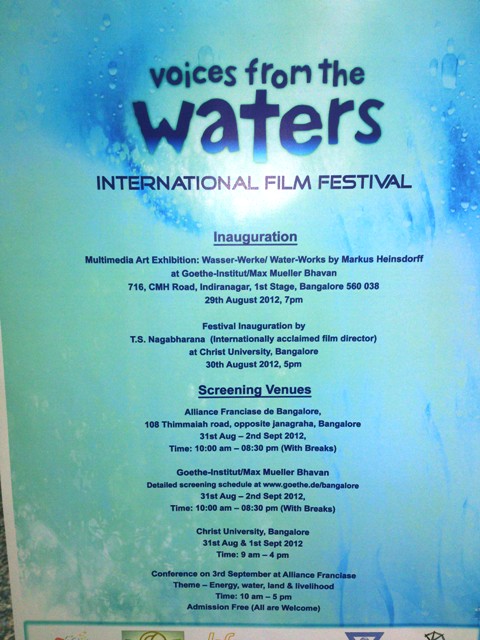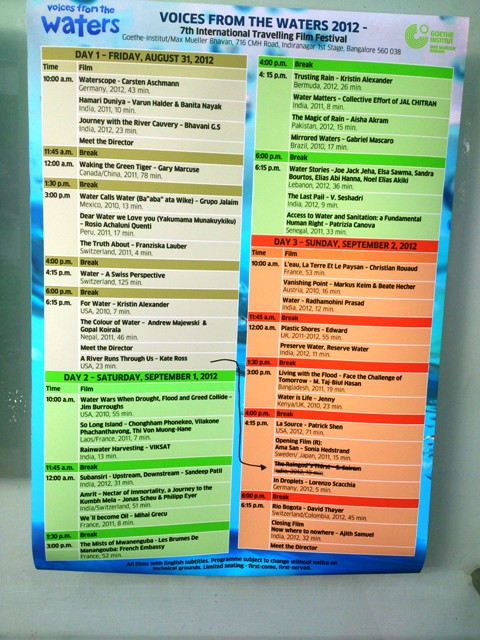History has witnessed World War I and II; will there be a World War III? Indeed, if there will be, it will be 'The World War III - for Water'. Can there be a second thought to this after the call for a Karnataka bandh on Saturday, 6 October 2012, in the name of water?
Water has always been the global commons of nature, that bring the diversities of the world together. In the beginning of civilization 'water' was a mode of transport to cross borders. For the first time 'water' was the reason for people to come together across the borders. There have been several attempts running in parallel to get the civilized world to realise the need to maintain the water cycle. One such attempt comes from "Voices from the Waters", an international film festival that ran for the 7th time in Bangalore, the only city in the world hosting the films on the rivers & streams of the universe.
The festival with an objective to screen 42 films across three days - 31 August 2012 to 2 September 2012 at Goethe-Institute/Max Mueller Bhavan, Bangalore, successfully presented 37 films.

The host of films screened included "The Mists of Mwanenguba" in French, "Ama San" in Japanese, "Espelho D'Agua" in Portuguese, "Koch" in Turkish, "Rio Bogota" in Spanish, "We Love You" in Quechua, "Waterscope" in German, "Water is Life" in Kenyan and other films in English, Hindi and Kannada. It is evident the films screened were diverse in terms of subjects, languages, nationality etc.
"Voices from the Waters" not only screened the films but gave away copies of journals that included details on the maker, country, language and the synopsis of 42 films. The effort is worth appreciating; all these details on the films were covered not just in English but also detailed in the regional language of the State of Karnataka, 'Kannada'. This is a feature that portrays honest efforts towards making the film festival a success; by reaching as many individuals, through every possible way.

The next section will provide extracts from the films that will give an idea of the host of movies screened. The topics were not restricted to water/water pollution, but also touched on biodiversity, rains, forests and various other global commons of the nature.
•'L'eau, La Terre Et Le Paysan' (The Water, The Land, The Farmer), a French film directed by Christian Rouaud, dealing with the controversial issue of water pollution as a result of industrial agriculture in Britanny. The film delineated the disastrous effects of fertilizers, pesticides and liquid manure used in farming.
•'Tarangini', a Kannada film directed by Srinivas Kaushik, depicts the feelings of a doctor whose duty and moral responsibility is to protect the villagers from the harmful effects of poisonous chemical effluents released in the river running across the village.
•'Koch' (Nomadic), a Turkish film directed by Moldoseit Mambetakunov, focusing on the nomads, their living under the modern civilization – a challenge depicted between the nomad and the civilized.
•'Water – A Swiss Perspective', an English film (also in Deutsch, Francais & Espanol) published by "Presence Switzerland PRS' explains the ways in which Switzerland deals with its water resources and Switzerland’s contribution to the world with its know-how and experience.
•'Trusting Rain', an English film directed by Kristin Alexander, a short documentary on Bermuda’s ancient method of water conservation. The film intended to bring out the skills of Bermudians understanding, of capturing and conserving rainwater, since time immemorial; a skill that could effortlessly be cultivated across the globe.
•'Rio Bogota', a Spanish film directed by David Thayer, tracing the journey of Colombia’s Bogota river as it is fed by domestic and industrial pollutants and effluents from as many as 9 million people and runs into the Gulf of Mexico causing untold damage. The film covers efforts of one Bogotan whose goal is to clean up the river by ending the public differences and the corruption that were a cause for the state of the river. The film portrays her efforts to fulfill her noble goal.
•'We'll become oil', a silent film directed by Mihiai Grecu, depicts dry landscapes, filled with the traces of a meta-conflict, beyond visible political or ideological issue. The film covered the story of oil taking over history.
•'Now here to nowhere', a film directed by Ajith Samuel on the tributary of the Indus river, ‘Sutlej’, emerging from the serene mountain passes of Shipki La on the Indo-China border, amidst snowcapped peaks and deep valleys, transforming into an emerald green stream adorned with white pearl, halting shortly to strike the turbines of hydel workhorses before flowing into irrigation canals. The film depicts the river’s friendly and non-friendly human interface and the substantial effects thereof.
The intention of the film festival, to create awareness on the need to conserve water was supplemented with painting and photo exhibitions, art installations and active interactions with the film directors and water scholars.
All the films leave behind a thought in the minds of people who walk away after watching the films. "What makes an individual take the pain, to walk in the woods, in the hills, to even shoot these films. What can every individual do to make the other realise the worth of water?"
On behalf of India Water Portal and all the viewers, a heartfelt thank you to Georgekutty A.L., the Director of the Film Festival and all the associated groups for making it happen.